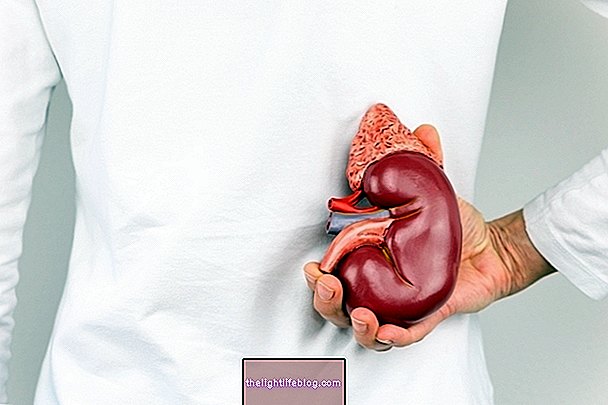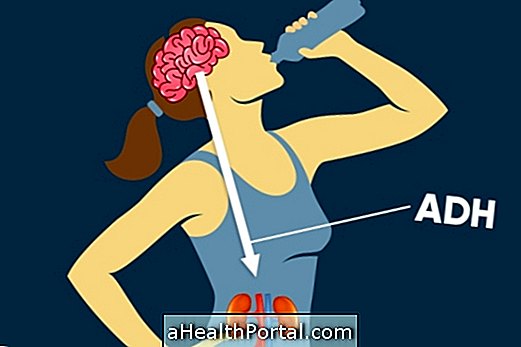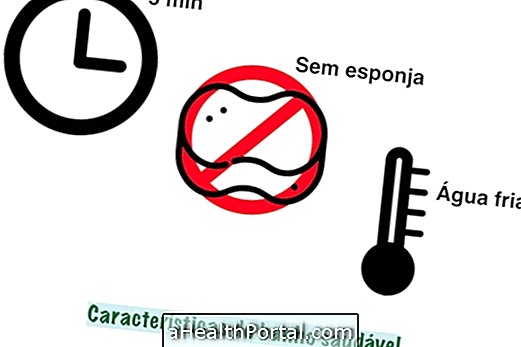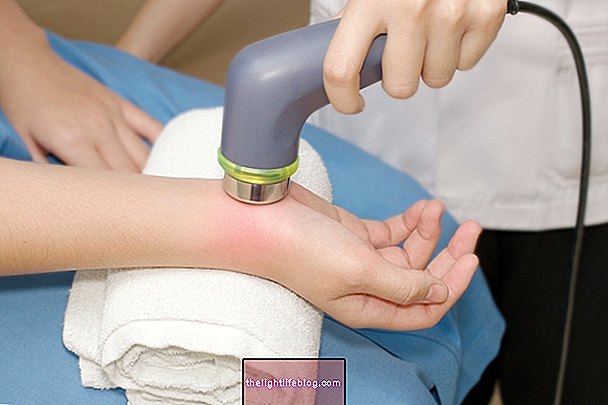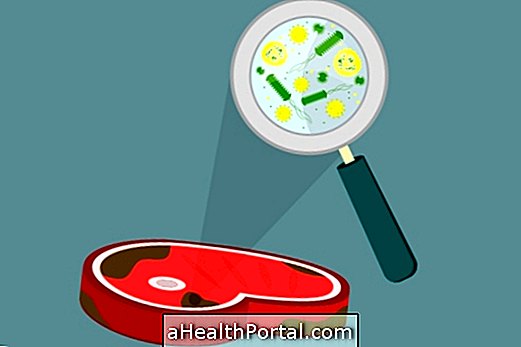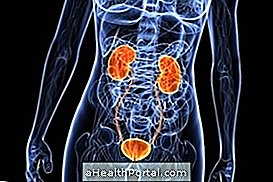The increase in the amount of creatinine in the blood is mainly related to changes in the kidneys, because this substance, under normal conditions, is filtered by the renal glomerulus, being eliminated in the urine. However, when there is a change in this organ, it is possible that creatinine is not filtered or is reabsorbed by the kidneys, remaining in the blood. In addition, the practice of intense physical activity can also favor an increase in the amount of creatinine in the blood, because this substance is produced naturally by the muscles.
The normal values of creatinine in the blood can vary according to the laboratory, in addition to being different between men and women, mainly due to the amount of muscle mass that the person has. Thus, it is considered that creatinine is increased in men when the concentration is greater than 1.2 mg / dL and in women when it is greater than 1.0 mg / dL. Learn more about the creatinine test.

1. Excessive physical activity
Performing intense and excessive physical activity, as is the case with athletes and bodybuilders, can lead to an increase in the amount of creatinine in the blood, not necessarily being related to kidney changes, but rather to the amount of muscle mass that the person has , since creatinine is produced in the muscles.
In addition, it is common for athletes to supplement creatine in order to favor the gain of muscle mass, which can also help to increase the levels of creatinine in the blood, because creatine is converted into creatinine in the body, however this change is easier to happen when creatine is consumed in amounts above what is recommended daily. Here's how to take creatine.
However, as the increase in creatinine is related to the amount of lean mass a person has, no treatment is necessary, as there are no signs indicating kidney changes.
2. Pre-eclampsia
Preeclampsia is a serious complication of pregnancy in which there are changes in blood vessels, with decreased blood circulation and increased blood pressure, which can put both the mother and the baby at risk. As a consequence of this change, it is possible to have kidney damage and accumulation of creatinine and metabolites in the blood.
It is important that the woman is regularly monitored by the obstetrician and regularly undergo routine examinations so that, if there are changes in the examination, the most appropriate treatment is started to reduce the risk of pregnancy. See more about pre-eclampsia.
3. Kidney infection
Kidney infection, also called nephritis, depending on where in the kidney it occurs, is a very uncomfortable situation and caused by bacteria that can be naturally present in the urinary system. The increase in creatinine normally when the infection is chronic, that is, when the bacteria was not fought or the treatment was not effective, which allows the bacteria to remain in place and favors kidney damage.
4. Renal failure
Renal failure is a condition characterized by changes in the functioning of the kidneys, so that these organs lose the ability to properly filter the blood, resulting in the accumulation of toxins and substances, including creatinine, in the blood.
Renal failure can have several causes, which can happen due to decreased blood circulation, which can happen in the case of dehydration, excessive use of protein supplements or as a consequence of the frequent use of medications. Learn about other causes of kidney failure.
5. Decompensated diabetes
Decompensated diabetes happens when high blood glucose levels are not treated according to the doctor's guidance, which can lead to the development of several complications, including kidney changes, which can result in increased levels of creatinine in the blood. blood.

Symptoms of high creatinine
When the creatinine in the blood is above the values considered normal indicated by the laboratory, it is possible that some symptoms may arise, such as:
- Excessive tiredness;
- Nausea and vomiting;
- Feeling of shortness of breath;
- Swelling in the legs and arms.
These symptoms are more frequent in people who have creatinine levels well above the normal reference value, and are also more common in people who have a family history of kidney disorders, who are over 50 years old or who have chronic diseases, like diabetes and hypertension, for example.
What to do
If it is found in the blood creatinine test that the levels of this substance are above the recommended value, the doctor usually requests to perform the urine creatinine test, as well as the creatinine clearance test, as this way it is possible to know if the change in creatinine levels is related to the kidneys and initiate the most appropriate treatment. Understand what creatinine clearance is and how it is done.
In the case of suspected creatinine alteration due to infection, in addition to the creatinine measurement in the urine, the doctor may recommend performing a uroculture with antibiogram, as it is thus possible to know which microorganism is related to the infection and which is the best antibiotic for the treatment. When increased creatinine occurs in pregnant women, it is important that the obstetrician is consulted as soon as possible, as this way it is possible to take the necessary precautions to decrease the risk of pregnancy.
Thus, based on the results of the exams, the most appropriate treatment is indicated to fight the cause and regulate the levels of creatinine in the blood, which also helps to relieve symptoms. Thus, depending on the cause, the use of diuretic, antihypertensive and / or antibiotic drugs may be indicated by the nephrologist or general practitioner.
How should the food be
As in most cases the increase in creatinine in the blood is related to changes in the kidneys, it is important that some changes are made in the diet to avoid overloading the kidneys and worsening the disease. Thus, it can be indicated by the nutritionist to decrease the consumption of proteins, salt and foods rich in phosphorus and potassium. Check how the food for kidney failure should be.
See in the video below more feeding tips for those who have kidney problems:

Was this information helpful?
Yes No
Your opinion is important! Write here how we can improve our text:
Any questions? Click here to be answered.
Email in which you want to receive a reply:
Check the confirmation email we sent you.
Your name:
Reason for visit:
--- Choose your reason --- DiseaseLive betterHelp another personGain knowledge
Are you a health professional?
NoMedicalPharmaceuticalsNurseNutritionistBiomedicalPhysiotherapistBeauticianOther
Bibliography
- BRAZILIAN SOCIETY OF NEPHROLOGY. The renal creatinine alarm. Available in: . Accessed on 15 Oct 2020
- BRAZILIAN SOCIETY OF NEPHROLOGY. Biomarkers in Nephrology. Available in: . Accessed on 28 Nov 2019
- SZWARCWALD, Célia L. et al. Reference values for laboratory tests for cholesterol, glycosylated hemoglobin and creatinine in the Brazilian adult population. Brazilian Journal of Epidemiology. Vol 22. 2nd ed; 2019
- MALTA, Deborah C. et al. Evaluation of renal function in the adult Brazilian population, according to laboratory criteria of the National Health Survey. Brazilian Journal of Epidemiology. Vol 22. 2nd ed; 2019





